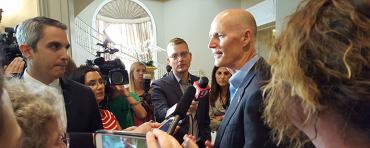
Gov. Rick Scott's Degrees to Jobs Summit is making believers of dozens of Florida college trustees, many of whom arrived unsure that they would get much out of the event -- but left the program's first day sharing ideas and chattering about "exciting possibilities."
"I came not knowing what we would be doing," Kris Rider, chairwoman of the Board of Trustees of Santa Fe College in Gainesville said during a break Wednesday. "But, wow -- this is exciting, encouraging and refreshing. It's giving us the answer to things we've seen coming for a long time."
The free-to-all program at Loew's Portofino Bay Hotel in Orlando was designed to bring together higher education leaders, employers and students because, said Scott, "I need business builders here. ... Everybody needs to be thinking, everybody needs to look at new ways to bring college students and good jobs together." The event drew 600 sign-ups, according to Scott's office.
Jim Clifton, president and CEO of Gallup -- Rick Scott's close friend for decades -- set the day up with an opening address. "Colleges and universities must change," he said, because they're absolutely useless to millennials. Millennials aren't looking for a paycheck, Clifton said. They want a job that has meaning, something that gives them meaning." (See a recent Clifton blog on this subject, reprinted on this page.)
Figures and anecdotes presented all day demonstrated ways several Florida colleges had taken the governor's challenge to keep tuition low and find ways to graduate students sooner.
Robert Woody, trustee at Florida A&M University in Tallahassee said the summit was "outdoing my expectations ... This really hits the money. Making sure students have the opportunity to get good jobs and make a living in today's economy is what we're all about as trustees. This is timely, the governor has us focusing. ..."
Ideas discussed included the governor's "internship challenge." (Several times Scott admitted, "I love challenges.") He told business men and women, "Hire an intern this summer and give your business a big boost. ... Get talented students before they enter the workforce and build a stronger business with young, eager students."
Colleges that facilitate internships are helping students pay off their college debt sooner, he said. But better than that, internships prepare new graduates to join the workforce as successes, give them the benefit of experience to direct them toward a more informed career path.
He said he would push next session for an increase to Bright Futures scholarship money just to keep the summer school program alive and well. Dual enrollment keeps students moving ahead, he said. And college is no place for remedial course work; students need to enter the college experience prepared in every area.
Other speakers described ideas like "rebating" the first year's tuition to students who perform well and graduate on time.
Phoebe Raulerson and Christa Luna, Indian River State College trustees representing the Okeechobee campus, said getting kids in and out of college quickly, to keep down student debt, is important in a rural city like theirs, where jobs offer a tighter paycheck. "It's stimulating to hear ideas that are working at other colleges," Raulerson said.
Only 44 percent of college and university students in Florida finish in four years, Scott said, and treading water like that is the biggest contributor to staggering student debt and creating more "down time" -- the time a student should, but isn't, out in the world earning.
According to the Florida College System and Florida Board of Governors, taking longer to graduate costs as much as $50,000 a year. In fact, the average a Florida university student pays for a 120-credit-hour, four-year education is $84,319; another year spent on that degree, hanging on but not earning, amounts to an additional $49,529; another two years is $99,058 more. To graduate in four years from a Florida college is $68,996; but to stay around working on the same degree another year adds $48,080; two more years adds $93,957.
Randall Reid, trustee at Hillsborough Community College, said he got a lot out of all the main speakers' presentations, but more than anything he was learning just from hearing from the "people who are doing. ... That's what I like about this, the chance to hear what specific, creative things colleges are doing to help us perform better and produce better results for our students."
Armando Olivera, trustee at Miami Dade College, said he was profiting from the "opportunity to share" with colleagues across the state. "I'm finding some of the informal discussions I'm having with others here just as important as the program. Everybody is anxious to share what they're doing."
The governor's afternoon keynote address -- positive and delivered without notes -- packed the resort ballroom and received an enthusiastic standing ovation.
The Degrees to Jobs Summit continues all day Thursday with a schedule that includes Agriculture and Consumer Services Commissioner Adam Putnam and a panel on leadership and teamwork featuring the "big three" Florida university coaches, FSU's Jimbo Fisher, UF's Jim McElwain and Miami's Mark Richt.
Reach Nancy Smith at nsmith@sunshinestatenews.com or at 228-282-2423. Twitter: @NancyLBSmith


